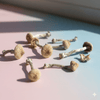Depression pulls you away from everything. From yourself, other people, and the basic joy of being alive. For years, the best treatment we've had are antidepressants that just mute the symptoms.
But lately, research from places like Johns Hopkins and Imperial College has pointed toward something much more effective - psilocybin, the main psychoactive compound in “magic mushrooms.”
In several trials, it’s helped people with even the toughest forms of depression. The effects aren’t fleeting either. They can last for months after just one or two sessions.
I can confirm that from personal experience. After years of addiction and feeling stuck in my own head, one deep psilocybin journey shifted something fundamental.
The Science: How Psilocybin Works
Chemically, psilocybin looks a lot like serotonin, the neurotransmitter that shapes mood and perception. But unlike SSRIs, which effectively flood the system with serotonin, psilocybin targets one specific receptor: 5-HT2A. These receptors are clustered in the prefrontal and visual cortices, areas involved in thinking, perception, and self-reflection.
When psilocybin binds to them, something pretty remarkable happens: the brain becomes more connected. This results in rigid thought loops loosening, and communication between brain regions that usually don’t talk much increasing.
In a wildly popular video by neuroscientist Andrew Huberman, he says that psilocybin “opens the channels.”
For a depressed brain - often locked into narrow, repetitive thinking - this flexibility can feel like waking up. People describe it as “reconnecting,” “feeling alive again,” or “seeing life in colour for the first time in years.”
Set, Setting, and the Inner Journey
The science is clear on this. How and where you take psilocybin matters as much as the dose. The best outcomes happen in safe, intentional environments, often with eyes closed, supportive music, and a guide or sitter present.
During my 5-gram session, I followed that same setup. But the experience was still rough, with waves of anxiety, feelings of death, and the unnerving sense of everything dissolving. However, after a few hours of that, a deep stillness overtook me. A kind of clarity I’d never felt before.
I saw my addiction differently. Not as something bad, but as a symptom of disconnection and a form of self protection. The mushrooms didn’t erase my pain. But they did grant me the space to change my relationship with it. In the weeks that followed, my mood lifted naturally, and cravings lost their grip.
Microdosing: The Gentle Reset
While high-dose journeys can spark huge insights, microdosing helps weave them into daily life. At doses around 0.1g, you don’t hallucinate. You just feel slightly more open, happy, and grounded.
Huberman points out that at this level, psilocybin still promotes neuroplasticity (the brain’s capacity to rewire itself) but in a subtle, sustainable way.
For me, it makes everything lighter. Music feels richer, conversations flow more easily, and even doing the dishes can be oddly enjoyable. It's not euphoric, but more like the return of natural joy.

The Default Mode Network: Breaking the Loop
Neuroimaging studies show that psilocybin temporarily disrupts something called the default mode network, which is the brain circuit responsible for your inner monologue.
In depression, this network becomes overactive, trapping you in loops of rumination and self-blame. Psilocybin seems to quiet that chatter, allowing new mental patterns to form.
Afterward, the brain reorganises itself in a more flexible, coherent way. Think of it like defragmenting a hard drive - clearing old junk and making room for fresh data.
Integration: Where the Real Change Happens
The “trip” is only the beginning. The real work comes in the days that follow, when your brain’s plasticity is wide open. That’s when new habits and emotional responses can actually take root.
For me, it meant journaling, meditating, and moving my body. Those practices turned fleeting insights into a new baseline. Microdosing can also help here, acting as a reminder or a subtle nudge to keep growing.
Nature’s Antidepressant
Psilocybin isn’t a magic fix. But it is a catalyst that helps the mind reset, reconnect, and find meaning again.
Used with the right mindset, support, and integration, it can transform not just how you feel, but how you relate to life itself.






